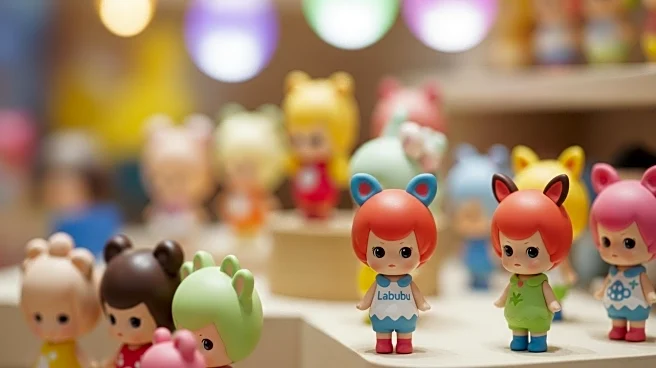What's Happening?
Pop Mart International Group Ltd., a Chinese toy maker, has experienced a rapid sell-out of its latest Labubu dolls upon their release in China. The rabbit-eared dolls were made available through various online platforms, including Pop Mart's WeChat and Tmall stores, at 10 p.m. local time. The demand was so high that the inventory was depleted before some customers could complete their purchases. The dolls are set to be available in Pop Mart's physical stores the following day. This strong consumer interest in China is expected to extend to international markets such as the U.S., Thailand, and Australia, where the dolls will be available online starting Friday morning. The popularity of these toys is reminiscent of past collectible crazes, such as the Beanie Baby phenomenon in the U.S. Pop Mart's CEO, Wang Ning, attributes the staggered release to the hand-sewn complexity of the dolls, which limits production speed.
Why It's Important?
The instant sell-out of Pop Mart's Labubu dolls highlights the ongoing consumer enthusiasm for collectible toys, which can have significant implications for the toy industry and retail markets. The success of these dolls in China suggests potential for similar demand in international markets, including the U.S., which could bolster Pop Mart's global expansion efforts. The craze also underscores the effectiveness of Pop Mart's blind-box model, which adds an element of surprise to purchases, enhancing consumer engagement. Additionally, the high resale value of these dolls indicates a thriving secondary market, which can drive further interest and investment in collectible toys. However, the sustainability of this demand remains uncertain, as past collectible fads have shown that interest can wane over time.
What's Next?
As Pop Mart prepares to launch the Labubu dolls in international markets, the company may face challenges in maintaining production levels to meet global demand. The high interest in these dolls could lead to increased scrutiny from investors regarding the sustainability of the buying craze. Pop Mart may also need to address issues related to counterfeit products, as fake Labubu dolls have already been seized by Chinese customs. The company might consider expanding its production capabilities or exploring new marketing strategies to sustain consumer interest. Additionally, the pricing strategy for Western markets, where the dolls are priced higher than in China, could impact sales and require adjustments based on consumer response.
Beyond the Headlines
The popularity of Pop Mart's Labubu dolls reflects broader cultural trends, including a desire for escapism and customization during uncertain economic times. The dolls' appeal may be driven by their 'ugly-cute' aesthetic, which resonates with consumers seeking unique and personalized items. The involvement of influencers and celebrities in promoting these toys further highlights the role of social media and celebrity culture in shaping consumer preferences. As Pop Mart continues to expand its presence in the designer toy market, it may influence other companies to adopt similar marketing and production strategies, potentially leading to shifts in the industry.









